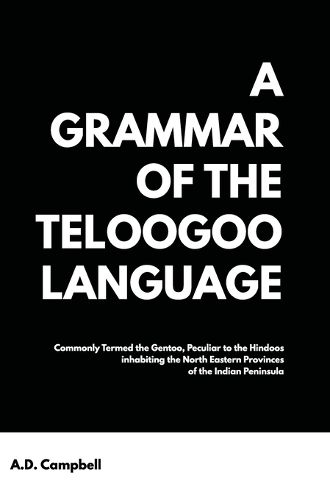Readings Newsletter
Become a Readings Member to make your shopping experience even easier.
Sign in or sign up for free!
You’re not far away from qualifying for FREE standard shipping within Australia
You’ve qualified for FREE standard shipping within Australia
The cart is loading…






This title is printed to order. This book may have been self-published. If so, we cannot guarantee the quality of the content. In the main most books will have gone through the editing process however some may not. We therefore suggest that you be aware of this before ordering this book. If in doubt check either the author or publisher’s details as we are unable to accept any returns unless they are faulty. Please contact us if you have any questions.
The language of which a Grammar is now offered to the Public is commonly, but improperly, termed by Europeans the Gentoo. It is the Andhra of Sanscrit author, and, in the country where it is spoken, is known by the name of the Trilinga, Telinga, Teloogoo, or Tenoogoo. This language is the vernacular dialect of the Hindoos, inhabiting that part of the Indian Peninsular, which, extending from the Dutch settlement of Pulicat on the Coast of Coromandel, inland to the vicinity of Bangalore, stretches northwards, along the coast as far as Chicacole, and in the interior to the sources of the Tapti; bounded on the east by the Bay of Bengal, and on the west by an irregular line, passing through the western districts belonging to the Soubahdar of the Deccan, and cutting off the most eastern provinces of the new state of Mysore: - a tract including the five Northern Circars of Ganjam, Vizagapatam, Rajahmundry, Masulipatam, and Guntoor; the greater portion of the Nizam's extensive territories; the districts of Cuddapah and Bellari ceded by him to the British; the eastern provinces of Mysore; and the northern portion of the Carnatick: nor is this language unknown in the more Southern parts of India, for the descendants of those Teloogoo families which were deputed by the kings of Vidianagara to controul their southern conquests, or which occasionally emigrated from Telingana to avoid famine or oppression, are scatered all over the Dravida and Carnataca provinces; and ever retaining the language of their forefathers, have diffused a knowledge of it throughout the Peninsula.
$9.00 standard shipping within Australia
FREE standard shipping within Australia for orders over $100.00
Express & International shipping calculated at checkout
This title is printed to order. This book may have been self-published. If so, we cannot guarantee the quality of the content. In the main most books will have gone through the editing process however some may not. We therefore suggest that you be aware of this before ordering this book. If in doubt check either the author or publisher’s details as we are unable to accept any returns unless they are faulty. Please contact us if you have any questions.
The language of which a Grammar is now offered to the Public is commonly, but improperly, termed by Europeans the Gentoo. It is the Andhra of Sanscrit author, and, in the country where it is spoken, is known by the name of the Trilinga, Telinga, Teloogoo, or Tenoogoo. This language is the vernacular dialect of the Hindoos, inhabiting that part of the Indian Peninsular, which, extending from the Dutch settlement of Pulicat on the Coast of Coromandel, inland to the vicinity of Bangalore, stretches northwards, along the coast as far as Chicacole, and in the interior to the sources of the Tapti; bounded on the east by the Bay of Bengal, and on the west by an irregular line, passing through the western districts belonging to the Soubahdar of the Deccan, and cutting off the most eastern provinces of the new state of Mysore: - a tract including the five Northern Circars of Ganjam, Vizagapatam, Rajahmundry, Masulipatam, and Guntoor; the greater portion of the Nizam's extensive territories; the districts of Cuddapah and Bellari ceded by him to the British; the eastern provinces of Mysore; and the northern portion of the Carnatick: nor is this language unknown in the more Southern parts of India, for the descendants of those Teloogoo families which were deputed by the kings of Vidianagara to controul their southern conquests, or which occasionally emigrated from Telingana to avoid famine or oppression, are scatered all over the Dravida and Carnataca provinces; and ever retaining the language of their forefathers, have diffused a knowledge of it throughout the Peninsula.